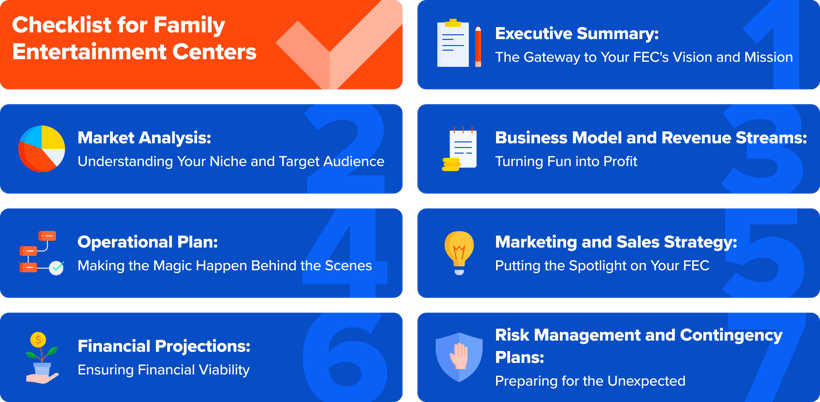A Comprehensive Business Plan Checklist for Family Entertainment Centers

Embarking on the journey of launching a Family Entertainment Center (FEC) is an exciting venture, but success begins with a solid business plan. Crafting a comprehensive roadmap helps secure funding and ensures a clear vision and strategy for long-term success.
One crucial element of a well-structured plan is choosing the right family entertainment center software to streamline bookings, manage guest experiences, and optimize operations. The right platform can simplify day-to-day management and enhance the overall success of your venue.
In this in-depth checklist, we’ll help you identify all of the things you need to create a robust business plan for your FEC.
1. Executive summary: the gateway to your FEC's vision and mission
- Business overview: include a compelling narrative that encapsulates your FEC's essence, outlining the unique experiences it offers and the target audience.
- Founding date and location: specify the founding date and location, emphasizing the chosen site's strategic importance and relevance to your target market.
- Ownership structure: clearly articulate the ownership structure, defining each stakeholder's roles and contributions. This section is crucial for potential investors or partners.
- Mission and vision statements: develop concise and inspiring mission and vision statements. Explain why these statements are integral to your FEC's identity and how they align with your target market's expectations.
2. Market analysis: understanding your niche and target audience
- Target demographics: dive deep into the demographics of your target market, explaining how understanding these factors will influence your FEC's offerings and marketing strategies.
- Competitor analysis: provide a detailed competitive analysis, highlighting not just who your competitors are but also how your FEC will differentiate itself to capture a unique market share.
- Trends and industry insights: articulate the current industry trends and insights, demonstrating your awareness of market dynamics and your strategy for adapting to or capitalizing on these trends.
- SWOT analysis: conduct a SWOT analysis, explaining the strengths, weaknesses, opportunities, and threats and how your FEC will leverage strengths and mitigate weaknesses.
3. Business model and revenue streams: turning fun into profit
- Attractions and services: Detail the attractions and services your FEC will offer, connecting these offerings directly to your target market's preferences and desires.
- Pricing strategy: Clearly define your pricing strategy, explaining how it aligns with your market analysis and business model. Discuss the perceived value of your offerings and how pricing contributes to profitability.
- Membership programs: If applicable, outline membership programs, emphasizing customer benefits and the additional revenue streams they generate.
- Partnerships and sponsorships: Explore potential partnerships and sponsorships, explaining how these collaborations contribute to revenue, the overall experience for customers, and exposure for partners.
4. Operational plan: making the magic happen behind the scenes
- Staffing structure: define the organizational structure, emphasizing the significance of each role in delivering a seamless customer experience. Highlight training programs to ensure staff aligns with your FEC's mission.
- Training programs: elaborate on team member training programs, emphasizing their importance in creating a positive and memorable customer experience.
- Operating hours: specify operating hours, tying them back to market analysis and customer behavior. Explain how flexible hours or seasonal variations contribute to overall customer satisfaction.
- Supplier relationships: establish the importance of solid supplier relationships, ensuring a steady supply of games, food, and other services. Detail any exclusivities or special arrangements.
5. Marketing and sales strategy: putting the spotlight on tour FEC
- Digital presence: articulate your digital presence strategy, emphasizing how your online platforms and an FEC ticketing solution will engage customers, build a community, and drive attendance.
- Traditional marketing: explore traditional marketing channels, explaining their relevance and how they complement your digital strategy. Emphasize local partnerships and events.
- Customer loyalty programs: describe loyalty programs and their importance in fostering repeat business. Highlight how these programs contribute to long-term customer relationships and increased revenue.
- Sales forecast: provide a detailed sales forecast, explaining the methodologies used. Relate this to your market analysis, demonstrating a clear understanding of demand and revenue projections.
6. Financial projections: ensuring financial viability
- Start-up costs: detail all initial costs, explaining the necessity of each expense. Connect these costs to the overall vision and mission of your FEC.
- Revenue projections: provide a detailed breakdown of projected revenue, tying back to the attractions, services, and pricing strategies outlined in your business model. Explain how these projections align with industry standards and market demand.
- Expense projections: list expected operational expenses and overhead costs, emphasizing cost-control measures. Demonstrate how these expenses are necessary for delivering on your FEC's promises.
- Break-even analysis: conduct a break-even analysis illustrating the point at which your FEC becomes profitable. Explain the significance of this milestone for both short-term and long-term financial success.
7. Risk management and contingency plans: preparing for the unexpected
- Identifying risks: identify potential risks, explaining how thorough risk assessment contributes to proactive management and the long-term sustainability of your FEC.
- Mitigation strategies: develop strategies to mitigate identified risks, demonstrating your commitment to creating a resilient and adaptable FEC.
- Contingency plans: outline contingency plans for unforeseen circumstances, emphasizing their importance in maintaining operational continuity and customer trust.
- Insurance coverage: ensure comprehensive insurance coverage, connecting this to the risk management strategy. Emphasize the protection it provides to both your FEC and its customers.
Creating a business plan for your FEC is not just a necessary step; it's a foundational blueprint for success. This comprehensive checklist provides a detailed roadmap, ensuring every aspect of your FEC's vision, strategy, and operations is meticulously planned.
Investing time and effort in crafting a robust business plan sets the stage for a thriving and memorable family entertainment experience. To learn more about how ROLLER's FEC software can save you time, grow revenue, and delight your guests, contact us for a demo!
Read this next: How to Manage Risk at Your Attractions Venue
Related articles


How to build a pricing strategy that supports your business goals

What Every Venue Needs to Know About Birthday Parties (from a Parent and a Pro)
Enhance your guest experience
Get free education, tips and inspiration to help you run a successful venue.